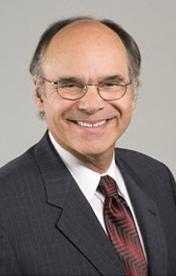Lehigh University
Office or Center Name Here
Chris D. Poland
Chairman & CEO, Degenkolb Engineers, San Francisco, CA
Building Disaster Resilient Communities
click here to view video
Friday, April 8th, 2011 – 4:10 pm
Sinclair Lab Auditorium
Chris D. Poland, SE, FSEAOC, NAE, Structural Engineer & Senior Principal, Chairman & CEO - Degenkolb Engineers: Chris Poland’s structural engineering career spans over 35 years and includes a wide variety of new design work, seismic analysis and strengthening of existing buildings, structural failure analysis, and historic preservation. As an internationally recognized authority on earthquake engineering, Mr. Poland routinely participates in policy-changing research projects sponsored by the NSF, USGS, NIST and FEMA. As a passionate advocate and voice for seismic safety, he actively participates in the academic, ethical and social advancement of his field and lectures often. Chris currently presides as Chair of the congressionally mandated Advisory Committee on Earthquake Hazards Reduction for the National Earthquake Hazards Reduction Program. His latest interests involving advocacy for Resilient Cities led to his involvement in the SPUR Resilient City Initiative as the chair of the Seismic Hazard Mitigation Taskforce. That work led to his Co-Chair appointment to the San Francisco Lifelines Council. He chairs the ASCE Standards Committee on Seismic Rehabilitation, and led the effort needed to produce the ASCE 31 and ASCE 41 Standards. He is a member of the Boards of the San Francisco Chamber of Commerce and the San Francisco Planning and Urban Research Association. He is the 2006 recipient of the Alfred E. Alquist award from the California Earthquake Safety Foundation, and was recently elected to the National Academy of Engineering in recognition of his career long work in support of Performance Based Earthquake Engineering. Chris served on the Board of the Earthquake Engineering Research Institute (EERI) for 10 years in two separate roles, first as the Secretary and then as the President from 2001 to 2002, and was the General Chairman of the 100th Anniversary Conference commemorating the 1906 San Francisco Earthquake.
Building Disaster Resilient Communities: Healthy cities continuously grow by driving economic development while protecting their cultural heritage. Success, in part, depends on a healthy built environment that is rooted in contemporary urban planning, sustainability and disaster resilience. Our job, as design professionals, is to provide a built environment that supports all of those goals. Our designs need to be efficient, economical, adaptive, sustainable, and disaster resilient, regardless of which disaster strikes. We are doing well on all fronts except for the last. We need to develop, and have added to the code, provisions that will provide the buildings and lifelines needed to support disaster resilience. The San Francisco Planning and Urban Research Association (SPUR) recently published four policy papers related to what San Francisco needs from its seismic mitigation policies. Called the Resilient City Initiative, the papers define resiliency in a deterministic manner based on what the city needs from its buildings and lifelines to support response, recovery and rebuilding post-disaster. It is a set of goals that can be applied to any community facing any natural disaster. At the heart of the recommendations are the need for clarity in the hazard level and the expected damage from a disaster. Resilient communities have a credible disaster response plan that assures a place and ability to govern after a disaster has struck. While making the shift to updated codes requires new policies and community support, that change is not possible without solid, unified support from the science, architecture and engineering communities that support design. We need to take the time to understand this issue, join the conversation about how to achieve resiliency, build it into our research programs, convince our owners to incorporate it in their projects, and be a part of the common voice from our profession on how to change the codes. This is being done in San Francisco and steps are being taken to implement the SPUR recommendations.
The Fazlur R. Khan Distinguished Lecture Series has been initiated and organized by Dan M. Frangopol, the first holder of Lehigh's Fazlur Rahman Khan Endowed Chair of Structural Engineering and Architecture.
